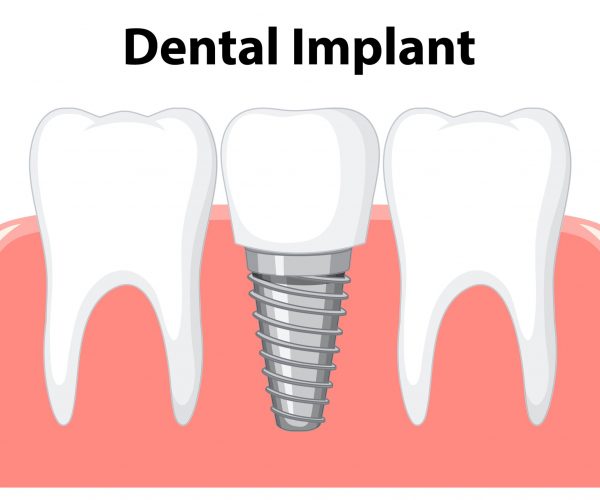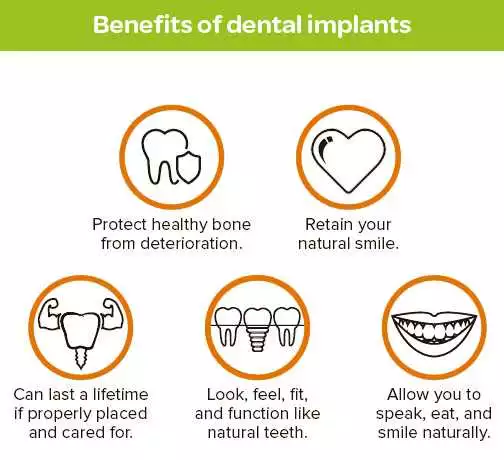Dental implants are used to replace missing teeth and support dental bridges.
They are made of titanium, which is compatible with the human body.
They are screwed into the jawbone and a crown is placed on the implant to look and function as the crown of a natural tooth.

How does a dental implant/tooth implant work?
Dental implants are considered the standard of care for prosthetic replacement of missing teeth.
An implant screw is placed inside the jaw bone and is allowed to fuse with it.
The process of blending between the dental implant and jawbone is called “osseointegration.”
Implants are made up of titanium, an element that is biocompatible.
Having a dental implant fused to the jawbone is the closest thing to resemble a natural tooth.

What are the steps of dental implant/tooth implant treatment?
Diagnosis and treatment planning
In the diagnosis and treatment planning stage, the space around the missing tooth is evaluated and the number of implant screws and crowns is determined based on the amount of space that is available.
Placement of implant
The next step is the placement of the implant screw. This is a minor surgical procedure that is performed under local anaesthesia in the dental clinic.
Healing phase
Followed by this phase is the healing phase wherein, the implant is allowed to fuse with the underlying jaw bone in order to stabilise and be able to bear the load of biting forces once the crown has been placed.
This phase can take anything between 3-4 months based on the patient’s overall health, dental health, oral hygiene and medical history.
Prosthetic phase
Once the osseointegration of the implant screw with the bone has been confirmed using x-rays, the next step is performed–preparing the implant to receive a crown.

Benefits of Implants Over Other Options :

Dental implants are a more comfortable and stable option compared to dentures.
Dental implants do not cover a large part of the gum tissue like dentures do, which means that taste and temperature sensation are not lost while eating.
Dental implants take a longer time to complete, but they do not cause harm to nearby teeth like bridges can.
Dental implants have superior aesthetics and look very similar to natural teeth.
Dental implants can last a lifetime when done properly, unlike dentures and crowns and bridges.
Dental implants are a fixed option, which means they provide more comfort and stability.
Dental implants are standalone structures that do not cause harm to nearby teeth.
Dental implants are less expensive than dentures and bridges.
Dental implants are the first choice for replacement of missing teeth today.
- Dental implants are available in a variety of sizes and shapes.
Frequently asked questions
A dental implant is a titanium screw that is placed in the jawbone in the tooth root to replace a missing tooth or teeth.
Dental implants are absolutely safe and are routinely done in clinical practice to help replace a person’s missing tooth/teeth.
Yes, there are different types of dental implants and the right implant for you is chosen by your dentist/implantologist based on the location of the missing tooth, the thickness and height of the jaw bone in that area, health of the patient, and the amount that the patient is willing to spend.
The cost of dental implants depends upon the type of implant, the technique involved, surgical costs, bone grafts that may be needed in some cases, and the brand of implant one chooses.
When you are going for dental treatment like dental implants then it is obvious that you may doubt the intensity of pain in the dental implants. The dental implants are done when tooth loss occurs and it is a little painful, still, it is bearable.
For treatment like a dental implant, everyone is a candidate. Many of the techniques are available to deal with tooth loss.
Most of the patients feel very uncomfortable while eating the food during the initial few weeks and they feel comfortable after some period. Some patients feel a little sensation during the few days.
Dental implants are designed to last a lifetime with proper care.

